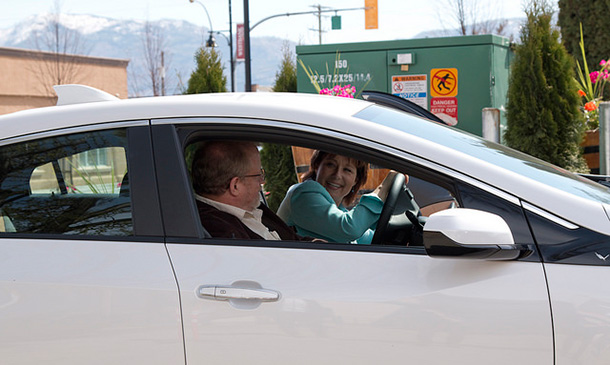[Editor’s note: The Tyee was a proud partner with Simon Fraser University’s Faculty of Environment on a recent undergraduate department opinion-editorial writing contest. Students had the chance to workshop their ideas and turn their critiques into compelling arguments. After reading the final submissions, it’s clear the next generation is thinking critically about our environmental future ⎯ and it gives us hope. This is the first of three winning entries in the contest.]
Picture this. It’s a beautiful spring day in Vancouver, and you’re cruising around Horseshoe Bay in your new electric car. Sunglasses are on, the beats are going, and the sun’s rays are pouring through the car windows. You’re feeling great; not only do you live in the most beautiful place on Earth, but you’re doing something big to help keep it beautiful by purchasing an electric vehicle. After all, even though this car was a lot more expensive than a gas vehicle of the same class, everyone promised it would help save the environment.
But wait — can electric cars really make a difference?
Last semester at Simon Fraser University, one of my professors said something that really stuck with me. We were talking about how much product choice could solve significant environmental problems. At one point, my professor said jokingly, “No amount of fair trade chocolate is going to save the world,” and we all had a good laugh.
Yet how many times do politicians and the media tell us that if we just buy “green” products, everything will be fine?
As an environment student at SFU and an active participant in my family waste-to-energy company EnEco, I spend a lot of time thinking about, writing about and listening to other experts talk about environmental issues.
We all know how bad the state of the environment is, and most people feel urgent pressure to do something before it is too late. Yet when we focus our efforts on buying environmentally friendly products, we miss addressing the root cause of environmental issues. Plus, many of these products are not as green as we are led to believe.
No number of electric cars will solve environmental problems; no amount of any product will solve these issues. For a product to be truly green it cannot have any polluting consequences from any aspect of the entire production process, including all the resources used to make it and how everything is disposed of. Determining all the extensive effects of production processes requires something called a life-cycle analysis. As you can imagine, this isn’t easy or simple.
Take electric cars. A major component is the lithium ion battery. Friends of Earth Europe, the largest grassroots environmental network in Europe, says that mining lithium for batteries causes significant leaching of toxic chemicals into groundwater, is a major contributor to water scarcity issues, and causes extensive air pollution. Unfortunately, electric cars are not the only products that have these batteries; cellphones have them too.
As a student I learned about the negative environmental problems related to beef production, and so I decided to become a vegetarian. I felt so good about my decision and really thought I was making a difference ⎯ then I started reading about all the environmental issues related to soy products, the main staple of a vegetarian diet. My vegetarian phase did not last long.
I had read that if more people were vegetarians we could save the environment, but now I find that hard to believe. It seems that more often than not, when we try to fix one environmental problem by making a different product choice, we end up creating another.
Politicians love green product initiatives, because it makes people feel like they are solving environmental problems — even if they aren’t. In March 2015, B.C.’s energy minister, Bill Bennett, announced that the Clean Energy Vehicle program was renewed for another three years. The program gives consumers up to $5,000 for purchasing a battery electric vehicle.
So when citizens push for more environmental regulations, the government can proudly say it has a policy in place to encourage the purchase of electric vehicles, which will reduce pollution. The extreme pollution created from mining lithium for electric car batteries is never brought up.
The promise that electric vehicles will help the environment is deceiving and manipulative, a distraction from the real problem.
Whether it’s a lifestyle change like becoming a vegetarian, or buying as many green products or fair trade chocolate as we possibly can, no amount of inflated consumption is going to save the environment. Maybe there is a way that we can learn to produce all the things we love to consume in a way that does not create environmental damage. Or maybe the answer lies in finding a way to give back to the world more than we take from it.
Even if it is a bit misguided, the fact that so many people are willing to change their lives to help the environment gives me hope. Yet to save the world, we must do more than just buy different products ⎯ we must look deep within ourselves and focus our fight on addressing the root cause of environmental issues, and not just the products we buy. ![]()
Read more: Environment
















Tyee Commenting Guidelines
Comments that violate guidelines risk being deleted, and violations may result in a temporary or permanent user ban. Maintain the spirit of good conversation to stay in the discussion.
*Please note The Tyee is not a forum for spreading misinformation about COVID-19, denying its existence or minimizing its risk to public health.
Do:
Do not: